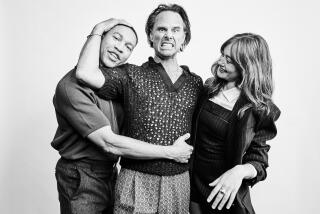For John Boyega and Will Poulter, the challenge was getting inside ‘Detroit’ as outsiders

- Share via
Reporting from DETROIT — Less than a week into production on the police-brutality docudrama “Detroit,” John Boyega found himself unnerved. The film’s director, Kathryn Bigelow, had told Boyega a schedule shift was forcing her to shoot a key interrogation scene that day instead of weeks later.
“We had just started filming and there we were in this critical scene,” the garrulous Nigerian British actor said recently at a Motor City restaurant with co-star Will Poulter. “I sat there on-set and all I could think of were Trayvon Martin and Sandra Bland and Michael Brown, and how when they woke up that day they didn’t know what would happen to them. I found myself staring at the handcuffs in the corner —”
“I noticed the same thing,” Poulter, an equally outgoing Brit, agreed excitedly from across the table.
“Those handcuffs —”
“Did you see the dried blood on the wall?”
“Yes! We had the exact same reaction.”
That may have been the rare time that could be said of the duo on “Detroit,” which opens nationally Friday. The well-reviewed film did strong business in limited release last week — bringing in $350,000 from 20 theaters — and is expected to mint $10 million to $15 million as it expands to more than 2,500 theaters.

“Detroit” trailer starring John Boyega, Will Poulter, Algee Smith, Jason Mitchell and John Krasinski.
Boyega, 25, and Poulter, 24, play law-and-order men of radically different outlooks and temperament. Poulter’s patrolman Philip Krauss is abrasive and abusive, while Boyega’s armed security-guard Melvin Dismukes is taciturn and brooding — a yin and yang of cinematic intensity.
Given their backgrounds, Boyega and Poulter might seem like left-field choices for the roles. The former is best known as Finn from the current “Star Wars” franchise and the latter as a sexually naïve teen in the hit comedy “We’re the Millers.” But their performances in the scalding drama of “Detroit” demonstrate that sometimes the best casting is the kind you never foresee, and that often the clearest way to hold up a mirror to America is with people from well outside it.
Directed by Bigelow (“The Hurt Locker”) from a journalistic script by Mark Boal, “Detroit” chronicles the harrowing true events at the city’s Algiers Motel during the civil unrest of 1967. Three Detroit police officers along with Dismukes and a National Guardsman were accused of enacting a reign of terror that led to the death of three young African American men. (A series of trials resulted in no convictions.)
Krauss and Dismukes — the former shares similarities with the white officer David Senak while the black Dismukes is a real-life figure — are on opposite sides of a divide.
Krauss is a ringleader of violence that also sees more than a half-dozen black men and two white women thrown against a wall and beaten in a trumped-up search for a gun. It’s a vicious performance, the actor’s babyfaced demeanor enhancing the effect.
“He’s a racist first and foremost,” Poulter said of how he delved into the Krauss character. “There’s nothing I can respect or acknowledge as sane. I didn’t want to apologize for him. But I don’t know that he’s a cosmic form of evil. He’s a human being responding to many of his frustrations by projecting blame on a single group,” adding, “he is the epitome of hate.”
Dismukes, on the other hand, participates only minimally in Krauss’ torturous stampede and wears a conflicted expression for much of the film.
Still, historians professional and armchair have posed the question: Should he have done more to intervene?
“Here’s the thing about telling someone to be a hero from your position of comfort: It doesn’t make sense,” Boyega said, laughing disbelievingly. The actor is an expressive sort who laughs to display more than just comedy — passion, skepticism, general emphasis. “I was sad he was labeled an Uncle Tom. That was like saying he didn’t have access to his feelings.”
Boyega paused. “Look, I totally get it. As a black person sometimes there’s an expectation to stand up in a particularly distinct way. But sometimes you can’t. Because what we all are before a certain color is human. And that can override everything else.”
(For his part, Dismukes said anyone who demanded action didn’t understand the situation. “I knew what was going on and that they [the cops] were going a little too far,” he said in an interview in downtown Detroit last week. “But there was nothing I could do about it.
“My way of trying to help,” he added, “was to try and go out to find the gun.” The security guard, who in the wake of the incident faced criticism from Detroit’s African American community and moved to a remote suburb, spoke to Boyega about his experiences when the actor was working on “Star Wars” in Europe.)
Plenty of contrasts exist between Poulter and Boyega in real life too. Tall and wiry, Poulter had a solidly middle-class upbringing as the son of a cardiology professor in the prosperous London neighborhood of Hammersmith. Compact and muscular, Boyega is the offspring of an immigrant preacher and grew up in economically strafed South London.
But they bonded as they tried to compute what happened in the Motor City in July 1967.
“Imagine, Will, if we saw tanks rolling down the street in London,” Boyega said.
“Just going down Portobello Road,” Poulter said, shaking his head.
The two men had come to Detroit to promote the movie, engaging in a series of appearances at the likes of the Charles Wright Museum of African American History. They were clearly outsiders. Poulter had been to Detroit only once previously, to film some quick scenes. (“Detroit” was shot in Massachusetts, for tax reasons.) Boyega had never been to Detroit.
Yet that otherness might actually have helped Poulter play a racist villain. Anthony Mackie, who co-stars as a Vietnam-vet survivor of the Algiers incident, said, “Will came from a place where he wasn’t apologizing, because it wasn’t his legacy. An American would have come from a place of apology. And that would have been a different performance.”

Poulter, incidentally, didn’t speak to Senak before shooting the movie; it was unclear which of the two had made that decision. The actor did watch online clips of Ku Klux Klan grand wizards and other white supremacists to understand a bigot’s mind set.
“It’s real-life horror footage,” Poulter said. “The level of certainty and confidence is what’s most horrifying.” He also began studying the Algiers incident, which to his frustration was not taught in British schools — or, he soon realized, American ones.
Boyega first learned about the Algiers when he was couch-surfing in Los Angeles waiting for a prolonged “Star Wars” audition process to play out. “I was staying with these girls I’d met at a party in Inglewood. It was Black History Month and they started watching things like [Tariq Nasheed’s global African docuseries] ‘Hidden Colors’ and episodes of ‘Roots.’ ” He soon learned about the Detroit uprising too, whetting his appetite for the eventual Boal script.
One hardly needs to be a fanboy to draw parallels between the character of Finn, a Stormtrooper who decides to abandon an establishment force after witnessing its cruelty, and Dismukes, a man conflicted after getting a similarly uncomfortable front-row view. Boyega didn’t elaborate when asked about the comparison but said the off-screen drama involving his casting as Finn — race-baiting criticisms followed by the actor’s famously cool “Get used to it” Instagram post — did set the table for this role.
“I was reminded of my color in a way that had nothing to do with the helmet,” he said. “It doesn’t matter where you go — a few ignorant individuals will come in and make comments about your race. Even though when you look behind the curtain it’s a bunch of idiots. A racist situation led me to see how ugly this world could be, but also led me to see that a lot of people aren’t racist.”
“Dismukes,” he added, “saw multiple sides of a situation too.”
While many of the actors subjected to Krauss’ worst behavior described a kind of trauma on-set, Poulter said being on the other end of the gun posed its own challenges. “We went to some extremely heinous scenes of violence and hatred. It was so hard. I’m two feet away from a man pointing a gun, and it looks like a real gun, and I pull what feels like a real trigger, and it sounds like a real bullet and a blood-bag explodes in my face. It was crazy to think of the pain I inflicted. And I thought, ‘If I felt that way acting, how the…. did that make [a real cop] feel?’”
The intensity of scenes like that have drawn some comparisons to a horror movie — and could, as the film is seen by more people, elicit some criticisms it exaggerates the brutality for dramatic or political ends. Poulter dismissed the idea.
“There are a lot of people who will watch this and say it’s hyperbolic, a caricature,” the actor said,
“You white [if you say that],” Boyega said, laughing acidly.
“They don’t know the research — sometimes we underplayed it.”
Boyega said being informed about the incident and the riots they were set against isn’t just about understanding historic horrors but modern troubles.
“I see ‘Detroit’ the movie as Detroit’s origin story,” he said. “The scars and the hurt. This place was victimized by systemic racism and violence. And that creates an imbalance that’s very, very hard to sort out.”
See the most-read stories in Entertainment this hour »
Twitter: @ZeitchikLAT
ALSO:
Kathryn Bigelow’s ‘Detroit’ takes on a tragedy then — and now
More to Read
Only good movies
Get the Indie Focus newsletter, Mark Olsen's weekly guide to the world of cinema.
You may occasionally receive promotional content from the Los Angeles Times.











